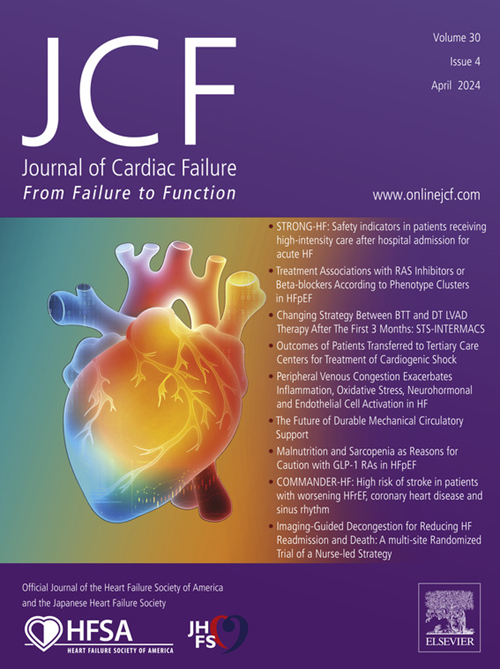心力衰竭治疗酮症:最新研究综述。
IF 6.7
2区 医学
Q1 CARDIAC & CARDIOVASCULAR SYSTEMS
引用次数: 0
摘要
心力衰竭的特点是心脏能量不足,近年来发现衰竭的心脏会增加酮体氧化以满足其能量需求。越来越多的证据表明,这种代谢适应对心脏有保护作用,这表明提高血酮水平的干预措施可以帮助衰竭的心脏。事实上,多个短期随访的小型临床试验表明,为衰竭的心脏提供外源性酮体可能会改善各种心力衰竭表现的心肌功能。因此,治疗性酮症是一种血液酮水平轻度升高的代谢状态,可能有很大的潜力来改善心力衰竭。治疗性酮症可以通过内源性运动或饮食习惯来实现,外源性通过补充酮体来实现,或药理学上通过钠-葡萄糖共转运蛋白-2抑制剂来实现。虽然由于缺乏关于长期益处和风险的可靠数据,目前还不能常规地向心力衰竭患者推荐酮症诱导疗法,但坊间证据表明,一些患者已经开始采用酮症诱导疗法,因此临床医生了解如何最佳地管理治疗酮症患者是很重要的。在这篇综述中,我们讨论了心力衰竭时的心肌酮代谢,心力衰竭患者治疗性酮症的现有证据,区分治疗性酮症和酮症酸中毒的病理状态的框架,以及坚持酮症诱导治疗的患者管理的实际考虑。本文章由计算机程序翻译,如有差异,请以英文原文为准。
Therapeutic Ketosis for Heart Failure: A State-of-the-Art Review
Heart failure is characterized by an energy-deprived heart, and in recent years it has been found that the failing heart increases ketone body oxidation to meet its energy demands. Accumulating evidence suggests that this metabolic adaptation is cardioprotective, suggesting that interventions that boost blood ketone levels could aid the failing heart. Indeed, multiple small clinical trials with short-term follow up have demonstrated that supplying the failing heart with exogenous ketone bodies may improve myocardial function across various manifestations of heart failure. As such, therapeutic ketosis, which is a metabolic state in which blood ketone levels are mildly elevated, could have great potential to ameliorate heart failure. Therapeutic ketosis can be achieved endogenously via exercise or dietary practices, exogenously via supplementation with ketone bodies, or pharmacologically via treatment with a sodium-glucose cotransporter-2 inhibitor. Although ketosis-inducing practices cannot be routinely recommended to patients with heart failure at this time due to a lack of robust data regarding the long-term benefits and risks, anecdotal evidence suggests that some patients have begun to adopt ketosis-inducing practices, so it is important for clinicians to be aware of how to manage patients optimally when they are in therapeutic ketosis. In this review, we discuss myocardial ketone metabolism in heart failure, the current evidence for therapeutic ketosis in patients with heart failure, a framework to distinguish between therapeutic ketosis and the pathologic state of ketoacidosis, and practical considerations for managing patients adhering to ketosis-inducing practices.
求助全文
通过发布文献求助,成功后即可免费获取论文全文。
去求助
来源期刊

Journal of Cardiac Failure
医学-心血管系统
CiteScore
7.80
自引率
8.30%
发文量
653
审稿时长
21 days
期刊介绍:
Journal of Cardiac Failure publishes original, peer-reviewed communications of scientific excellence and review articles on clinical research, basic human studies, animal studies, and bench research with potential clinical applications to heart failure - pathogenesis, etiology, epidemiology, pathophysiological mechanisms, assessment, prevention, and treatment.
 求助内容:
求助内容: 应助结果提醒方式:
应助结果提醒方式:


